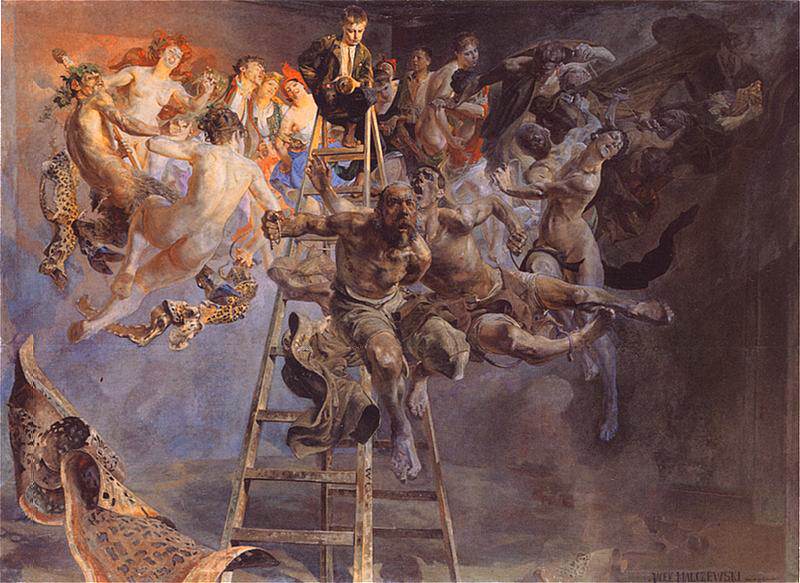
I’m very pleased to say
1) I have a new project in the works and
2) Art Pie is again media sponsor!
This project is smaller in scale than This ‘Me’ of Mine, but just as interesting. RECURSIVE explores the inner repetitive thought processes, both ones we’re aware of and ones we’re not. The works in the exhibition show evidence of this recursive thinking in action through the work. My goal for the blogsite is to create a place to discuss what repetition is, how it affects us, and why we’re so drawn to it. So far, that is working really well!
Here’s an example:
janeboyer
Submitted on 2014/05/16 at 1:03 pm
I’ve been thinking of how I feel about the change in repetition, and really, how would I put it into words?I can remember feeling ‘solid’, meaning I knew who I was in relation to where I was and who I was with. Mechanization made communities prosperous, providing most of the work for a local population.
I knew what products I could depend on, where to buy them and how much they would cost. I knew I would need to save money to afford more expensive things I wanted. There was stability in knowing products were readily available and in constant supply. I came home with products I liked in shopping bags. I could smell the production process of tires and toothpaste on the air, knowing they smelled polluting.Now, as someone involved in a digital world, I work where I do not live, I purchase products from all over the world which are shipped to me.
I feel guilty at the thought that less wealthy people than I (and I am not wealthy!) make the clothes I wear and have produced them in a very foreign place in unknown circumstances and at unknown costs to the environment. I feel ‘transparent’ as I share quirky little thoughts on twitter and downright exposed when I post anything on Facebook. I feel impinged by knowing that I can never decide to remove my profile on Facebook. I feel hectic and rushed even though I sit at a table most of my day typing on a keyboard.
I see almost no one, except my husband, throughout my workday. In short, I feel boxed, constrained, observed and strangely non-material in a world that I struggle to comprehend, as my thoughts flit from task to task, page to page, and site to site.
Ian Pickering
Submitted on 2014/05/16 at 4:50 pm
I am not sure that repetition is mechanisation. Farming is repetitive as is much basic craftwork. I am also tempted to suggest that change has always produced a response that things have got worse. Feeling transparent. That is an insight and I understand the idea of being simultaneously connected but isolated.
codedimages
Submitted on 2014/05/16 at 5:17 pm
I recognise your descriptions. I do feel though that I work where I live, but the product of that work is then spread instantly to all parts of the globe and to anyone who cares to take an interest. Working alone is lonely.
I envy those who have a physically located group to associate with and are able to share ideas face-to-face. I don’t know if any of this has repetition at its core though. I do know I would not want to turn the clock back entirely. I feel privileged to be able to discuss ideas with people all over the world.
Being able to find like-minds wherever they might be is a huge plus for the web. On the other hand I need to find a better balance, where at least some portion of time is spent physically co-located with other artists. I will be working on that aspect in the days, weeks, months and years to come.
Kay
Submitted on 2014/05/17 at 1:46 pm
A few thoughts on a great topicI knit and crochet so there is much repetition involved in those actions. By chance I found and continue to find those repetitions creative. The stitching can also have a meditative quality to it, awakening me to the moment.
I don’t expect every repetitive action to have a meditative quality to it however I do recognise actions which are engaging and enlivening and those which have a dulling effect.I have had interesting on-line conversations and got connected to collaborative on-line projects -which I would never have come across without the digital world – I do value them. What I find with digital media is that it is all too easy to get stuck in repetitive actions which don’t lead to anything in particular.
The impact of some digital repetition is to dull / numb the brain. Perhaps that is why we crave the connection with humans who aren’t glued to the screen. The connections can perhaps be more random, intuitive and exploratory.I also think that repetitive digital actions in office spaces are questionable. The assumption seems to be that if people are at the screen they are working and even engaged in their work.
I don’t agree. Humans create and work in a range of ways. As a fellow human I need variety and stimulation through words, textiles and other random moments to develop. This becomes more important as I get older. I work with older people and am obsessed with memory, aging, loneliness and isolation! A few of the comments here refer to people experiencing a sense of isolation even in a world of virtual connections.
I think it is essential to create spaces which integrate the virtual and physical nature of life (I love the makers library network). Isolation is a killer. As a human I want to be awake to this and create repetitions which sustain me and who know others around me.
——
We hope you’ll join us and join in the conversation…
Go to RECURSIVE


 I’m a terrible creature of habit. I like my routines because they free up brain space for more important stuff – the stuff where I can be really creative and unpredictable. Mostly, I live in harmony with my habits, enjoying their usefulness and the comfort they bring, but there have been times when my habits have given me cause for alarm.
I’m a terrible creature of habit. I like my routines because they free up brain space for more important stuff – the stuff where I can be really creative and unpredictable. Mostly, I live in harmony with my habits, enjoying their usefulness and the comfort they bring, but there have been times when my habits have given me cause for alarm.